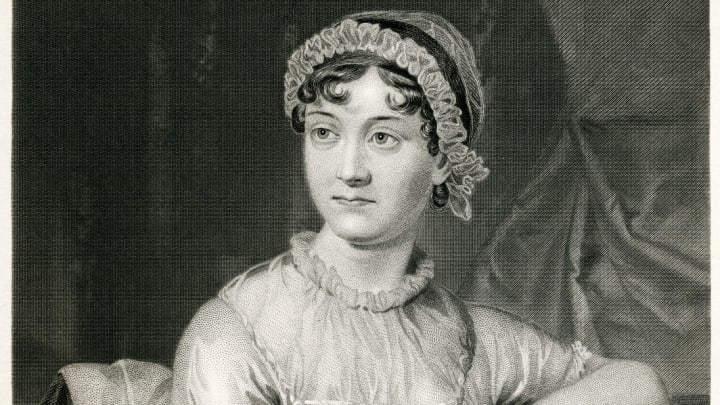Do you struggle with spelling bees? Do you always seem to get “lose” and “loose” mixed up? Would you recoil in terror if spell-check ever stopped working? Fear not: You're in good company. From Nobel Prize winners to the authors of great literary works, the inability to spell correctly has plagued some of history's most influential people. Here are 11 of the most famous.
1. JANE AUSTEN
Luckily, the author of Emma and Pride and Prejudice was always fortunate enough to find editors who could weed out her various alphabetical mishaps. An early work, written when Austen was 14, was called Love and Freindship.
2. GEORGE WASHINGTON
According to Richard Lederer in his book More Anguished English, the man who would become the first American president wrote “we find our Necessaties are not such as to require an immediate transportation during the harvist" while complaining about a supply shortage during the Revolutionary War. The National Archives cautions, however, that for many letters from 1787 to 1790, the spelling issues are actually the result of his nephew copying them: “The mistaken impression shared by some that the mature GW was a bad speller and careless writer derives in large part from the defects of Lewis and other copyists.”
3. WINSTON CHURCHILL
Though he later became universally regarded as one of the greatest orators of all time, one of Churchill's early report cards said “Writing good, but so terribly slow—spelling about as bad as it well can be.”
4. AGATHA CHRISTIE
“Writing and spelling were always terribly difficult for me... [I was] an extraordinarily bad speller and have remained so until this day.” It's incredible to think that this humbling statement came from the pen of one of the greatest mystery authors of all time: a woman who would later be celebrated as “The Queen of Crime." Later researchers have proposed that Christie could have been dysgraphic (and possibly dyslexic) [PDF].
5. ANDREW JACKSON
Examples of Old Hickory's seemingly innumerable botched spelling attempts include the continent of “Urope" and performing before a “larg audianc.” This ineptitude even went on to become a political punchline. His perennial political rival John Quincy Adams once denounced him as “a barbarian who could not write a sentence of grammar and hardly could spell his own name.”
6. ALBERT EINSTEIN
In Einstein's defense, English was his second language. It's therefore easy to understand why spelling and grammatical errors in his works were a constant source of frustration to the physicist. “I cannot write in English,” he wrote to a friend, “because of the treacherous spelling.”
7. ERNEST HEMINGWAY
Hemingway seemed to have difficulty with present participles, as “loving” became “loveing” and “moving” turned into “moveing” in his manuscripts. Whenever an editor complained of these bloopers, however, Hemingway would supposedly snap “Well, that's what you're hired to correct!”
8. F. SCOTT FITZGERALD
The original draft of The Great Gatsby contained literally hundreds of spelling mistakes, some of which are still confounding editors. These include “yatch” (instead of “yacht”) and “apon” (instead of “upon”). One of his most famous gaffes, which occurs toward the end of the novel, inspires debate to this day.
9. OLIVIA CLEMENS
“Livy's” frequent compositional errors were an endless source of amusement to her husband Samuel Clemens, a.k.a. Mark Twain. After receiving one of her letters, in which she miraculously made virtually no bloopers, he wrote “Oh you darling little speller!—you spell 'terrible' right, this time. And I won't have it—it is un-Livy-ish. Spell it wrong, next time, for I love everything that is like Livy. Maybe it is wrong for me to put a premium on bad spelling, but I can’t help it if it is. Somehow I love it in you—I have grown used to it, accustomed to expect it, & I honestly believe that if, all of a sudden, you fell to spelling every word right, I should feel a pain, as if something very dear to me had been mysteriously spirited away & lost to me. I am not poking fun at you, little sweetheart.” Despite Samuel's playful jabs, he relied upon his beloved wife as a “faithful, judicious, and painstaking editor” until her death in 1904.
10. WILLIAM BUTLER YEATS
According to biographer David A. Ross, “Yeats' spelling, indeed, seems at times a matter of wildly errant guesswork.” Ouch. The great Irish poet and senator's idiosyncratic writing style resulted in some distinctively misspelled words cropping up throughout his works, such as “feal” instead of “feel." Despite this Achilles' heel, Yeats won the Nobel Prize for Literature in 1923.
11. DAN QUAYLE
No list of famously bad spellers would be complete without mentioning the 44th Vice President's infamous “Potatoe Incident." The story goes that Quayle had the incorrect spelling on a cue card from the school—but perhaps ironically, Quayle may have ensured that everyone else spelled the word correctly. According to Ammon Shea, consulting editor for American Dictionaries for Oxford University Press, potatoe was used in respectable publications right up to the Quayle incident, when, according to Shea, “they suddenly drop off or become used in an ironic way, referencing this incident. Quayle may have misspelled the word, but in doing so perhaps he taught the rest of us how to not make his error.”
This piece originally ran in 2016.
